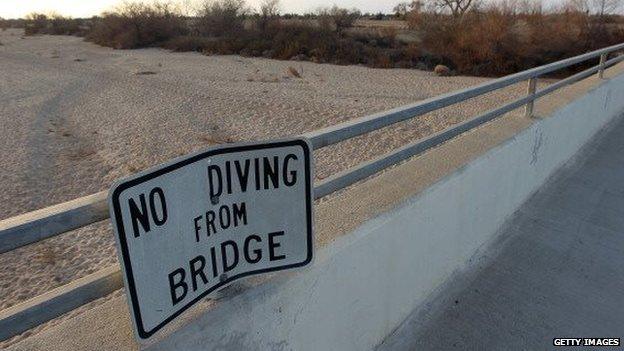California drought threatens environmental laws
- Published
- comments

Many rivers in California are running dry during this year's historic drought
When President Barack Obama travelled to Fresno, external, California on Friday, he waded into a decades-long water fight that is pitting farmers against fish. More than that, however, he is confronting a wider public policy debate that goes back at least a century - over the environment, industry, and the role of government.
While the East Coast is buried in snow and the UK is battling record flooding, California is in the midst of a historic drought. Last year it rained less than it had in any previous year since the state's founding in 1850. Rivers are flowing at record low levels, reservoirs are drier than ever, and the mountain snowpack - snow that melts over the coming months and provides water throughout the year - is only 20% of expected levels.
The issue is causing concern not just in California but across the country, which depends on the state's agricultural bounty. It also threatens the jobs of thousands of farm workers who will have neither fields to plough nor fruit to pick.
Republican lawmakers in Congress have proposed rolling back several environmental regulations and undoing years of negotiation over water issues in an effort to end what they are calling a "man-made drought, external".
"Environmentalists have decided that fish are more important than those who are unemployed," Representative Kevin McCarthy of California declared, external.
In their view, naive and idealistic environmentalists are selfishly preserving water for a largely unknown and useless fish, called the delta smelt. They are infuriated that water is being kept in the Sacramento-San Joaquin River Delta to protect an endangered fish. This water, they believe, could be used to irrigate fields and keep farm workers on the job.
This is just the latest iteration of a debate in the United States that traces its origin back to at least the administration of President Theodore Roosevelt in the early 20th Century.
On one side were conservationists such as Gifford Pinchot, the first chief of the Forestry Service, who believed that nature should be managed only so far as to maximise profitability into the future. Pinchot and his contemporaries believed that nature was to be commercialised, and resources like trees were to be treated as crops.
On the opposing side were preservationists such as John Muir, whose advocacy set aside Yosemite Valley and Sequoia National Park, among other areas. They believed that nature had intrinsic worth, and that natural areas should be protected for their wilderness and aesthetic value alone.
This debate has never been resolved in the US, though it has evolved to keep up with modern concerns and political language.
Today conservatives see environmental regulation as just another example of government overreach into the sacred free markets. Some go so far as to believe that the green movement is a dark horse for socialism in the United States.
"The proper view of nature should be how do we interact with our world and use its resources in order to benefit the greatest number of humans today, and to ensure that those who come after us have the resources to live well," writes, external Bruce Thompson of Frontpage Magazine.
In the US, meanwhile, the left typically embraces government as a check against pollution and the destruction of natural habitats. Like preservationists of old, today's liberals view species such as the delta smelt as a reflection of the state of the environment as a whole. If the smelt are doing well in California, then California's waterways are thriving. They call for more federally protected land for use as recreation and scenic areas.
A few weeks ago, more than 100 Democrats in the House of Representatives sent an open letter, external to the Obama Administration urging him to protect more land using his presidential authority.
"Gateway communities throughout the country benefit from Federal conservation efforts; resources are protected, visitor experience is enhanced, and local economies are enhanced," the letter said.
In 1996 President Bill Clinton, a Democrat, used this authority to designate Grand Staircase-Escalante National Monument. In the process, he prohibited the extraction of more than 60 billion tonnes of coal deposits in the area.
While in California on Friday, Mr Obama said, external the latest Republican move, and the larger push against environmental regulation in times of crisis, lacked foresight.
"We can't think of this simply as a zero-sum game," he said. "It can't just be a matter of there's going to be less and less water so I'm going to grab more and more of a shrinking share of water. Instead what we have to do is all come together and figure out how we all are going to make sure that agricultural needs, urban needs, industrial needs, environmental and conservation concerns are all addressed."
The editors of the San Jose Mercury News write, external that there are no easy answers to the problems confronting California. "Unless the president has found a way to issue an executive order to make it rain," they argue, people in the state will be disappointed.
All of this is why Democrats, like Representative Mike Thompson of California, say "it would be more productive for this body to join in a rain dance" on the House Floor than to vote for the Republican bill.
- Published12 February 2014
- Published1 February 2014
- Published18 January 2014